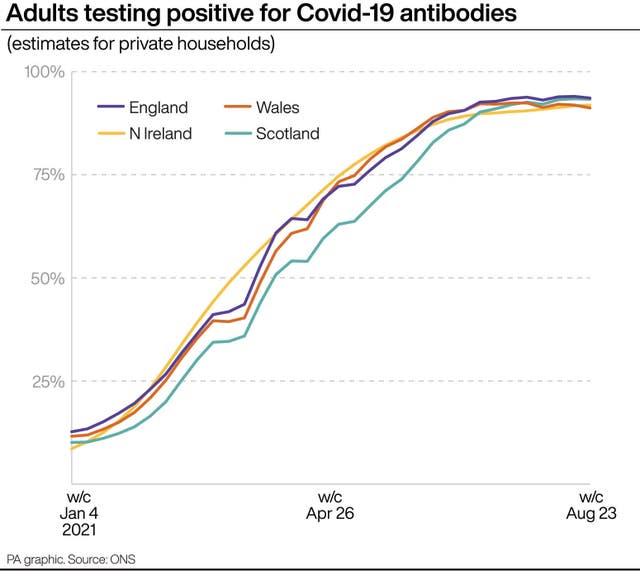Almost nine in 10 young adults in UK likely to have Covid-19 antibodies
Antibody levels have levelled off or declined slightly among adults in old age groups, however.

Nearly nine in 10 young adults in the UK are now likely to have Covid-19 antibodies, new figures suggest.
The estimates, which are for people aged 16 to 24, range from 86.9% in Wales to 88.7% in England and Scotland, with 87.2% in Northern Ireland.
The presence of coronavirus antibodies suggests someone has had the infection in the past or has been vaccinated.
It takes between two and three weeks after infection or vaccination for the body to make enough antibodies to fight the virus.
They then remain in the blood at low levels, although these can decline over time to the point that tests can no longer detect them.

The latest figures from the Office for National Statistics (ONS) are based on a sample of blood test results for the week beginning August 23.
The estimates are for people in private households and do not include settings such as hospitals and care homes.
Antibody positivity among 16 to 24-year-olds is “increasing steadily across all four UK countries”, the ONS said.
This has coincided with the rollout of Covid-19 vaccine to younger age groups.
First doses of vaccine have been available to teenagers aged 16 and 17 for several weeks, while all young adults aged 18 and over have been eligible for a jab since June.
In England the percentage of 16 to 24-year-olds likely to have Covid-19 antibodies has jumped from 60.6% in the week beginning June 21 to 88.7% in the week beginning August 23.
In Wales the figure has risen from 63.4% to 86.9% in the same period, while in Northern Ireland it has increased from 58.7% to 87.2%.
Scotland has seen a particularly sharp rise, from 51.1% to 88.7%.
Antibody levels have levelled off or declined slightly among adults in old age groups, however.
“In more recent weeks our estimates suggest those aged 25 to 64 years have similar or slightly higher antibody levels than those aged 65 years and over,” the ONS said.
“This is line with vaccinations for many of those in younger age groups occurring more recently.”
Many people in the oldest age groups, such as 75 to 79 or 80 and over, are likely to have received both doses of vaccine earlier this year, possibly more than six months ago.
Levels of antibody positivity are defined by a fixed amount of antibodies in the blood.
“Most older people who are vaccinated will retain higher antibody levels than prior to vaccination but may have a lower number of antibodies in the blood at the time of testing,” the ONS added.
In England an estimated 91.5% of people aged 80 and over were likely to have Covid-19 antibodies in the week beginning August 23, down from 93.7% two months earlier.
In Wales the proportion has dropped from 91.5% to 82.0%, while in Scotland it is down from 88.0% to 85.9%.
For Northern Ireland, the estimate for those aged 70 and over has fallen from 93.4% to 87.4%.
The ONS said there a clear pattern between vaccination and testing positive for Covid-19 antibodies, but “the detection of antibodies alone is not a precise measure of the immunity protection given by vaccination”.
Overall an estimated 93.6% of the adult population of England was likely to have tested positive for Covid-19 antibodies in the most recent week, along with 91.2% in Wales, 93.3% in Scotland and 91.9% in Northern Ireland.





